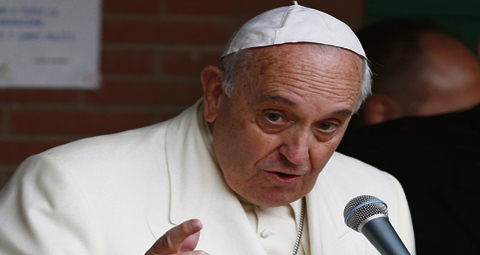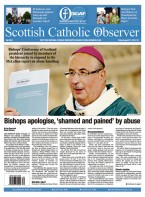December 25 | ![]() 0 COMMENTS
0 COMMENTS ![]() print
print

Pope warns against supporting slavery
Holy Father's message for the World Day of Peace on January 1
The Pope’s New Year’s peace message calls on all Catholics to beware of supporting slavery by buying morally compromised products.
“Together with the social responsibility of businesses, there is also the social responsibility of consumers,” Pope Francis said. “Every person ought to have the awareness that purchasing is always a moral-and not simply an economic-act.”
Referencing the 30 million people world wide who are forced to live in slave-like conditions, the Holy Father said he urgently appealed ‘to all men and women of good will not to become accomplices to this evil, not to turn away from the suffering of our brothers and sisters, our fellow human beings, who are deprived of their freedom and dignity.’
The Pope’s message for the World Day of Peace on January 1 was released earlier in December and he used it to call for personal responsibility, grass-roots action and international cooperation to combat the new and growing forms of ‘this abominable phenomenon’ of human exploitation.
His message, which the Vatican sends to heads of state around the world, invited everyone ‘to practice acts of fraternity toward those kept in a state of enslavement.’
Make an effort to ‘feel challenged when, in our daily lives, we meet or deal with persons who could be victims of human trafficking, or when we are tempted to select items which may well have been produced by exploiting others,’ he said.
Instead of closing one’s eyes to this tragedy, ‘do something about it,’ he said, by joining an association or ‘offering a kind word, a greeting or a smile’ that may give hope or change the life of someone who might be a victim of exploitation.
Praying for an end to all wars, conflicts and suffering caused by natural disasters and disease, Pope Francis said his thoughts were with the many men, women and
children in the world who have been robbed of their freedom and human dignity.
His thoughts went to those subjected to forced labour in the agricultural, mining and manufacturing industries; domestic workers; sex slaves; women or girls forced into marriages; people forced to fight as soldiers; and victims of terrorists, organ trafficking and ‘disguised forms of cross-border adoption’
“I think also of the living conditions of many migrants who, in their dramatic odyssey, experience hunger, are deprived of freedom, robbed of their possessions or undergo physical and sexual abuse,” he said, denouncing the sometimes ‘inhumane conditions’ migrants face when they are detained by authorities.
“While many find themselves working illegally or living clandestinely, others, in an attempt to act within the law, may ‘agree to disgraceful living and working conditions, especially in those cases where the laws of a nation create or permit a structural dependency of migrant workers on their employers, as, for example, when the legality of their residency is made dependent on their labour contract,” he said.
The Pope made special mention of the world’s congregations of women religious, who are especially active in ‘enormous and often silent efforts’ to help victims.
“This immense task, which calls for courage, patience and perseverance, deserves the appreciation of the whole Church and society,” the Pope said. “Yet, of itself, it is not sufficient to end the scourge of the exploitation of human persons.” Local, national and international governmental organisations must commit themselves to ‘prevention, to victim protection and to the legal prosecution of perpetrators,’ he added.
St Josephine Bakhita, the former Sudanese slave, is ‘an exemplary witness of hope for the many victims of slavery’ today, the Pope said. The first International Day of Prayer and Awareness against Human Trafficking will be marked Feburary 8, St. Josephine’s feast day. The new observance is being promoted for all dioceses, parishes and church groups by the council for migrants, the Pontifical Council for Justice and Peace and the international unions of superiors general of men’s and women’s religious orders.











